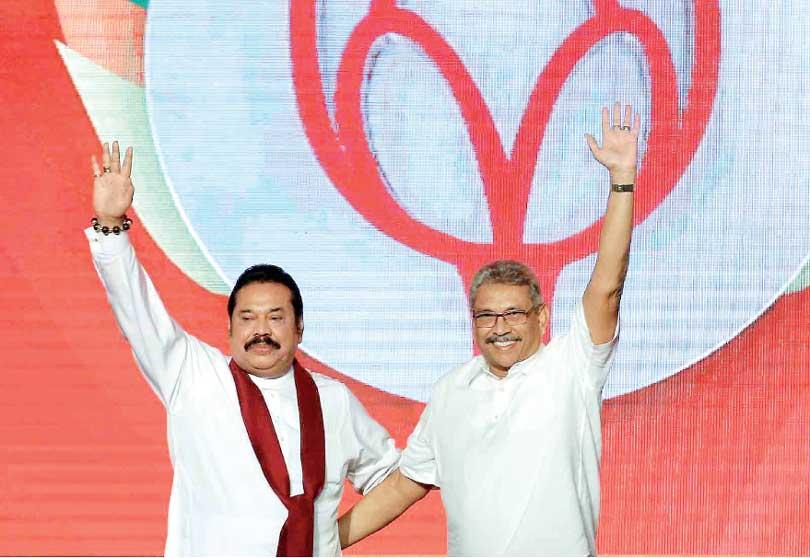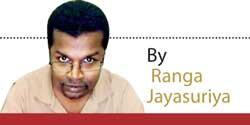28 Jul 2020 - {{hitsCtrl.values.hits}}

 Prime Minister Mahinda Rajapaksa and the fellow travellers of the Sri Lanka Podujana Peramuna (SLPP) are asking for a two-thirds majority in the general election. For what? They want to abolish the 19th Amendment to the Constitution, one of the few progressive constitutional provisions to be adopted in the independent history. (It moderated the excesses of the executive presidency). Mr. Rajapaksa also wants to introduce a new constitution. But, he has not said what would be in it. The sheer absence of detail is disturbing. The arbitrariness with which it would be deliberated is terrifying. Its implications for the democracy of the country would be crippling.
Prime Minister Mahinda Rajapaksa and the fellow travellers of the Sri Lanka Podujana Peramuna (SLPP) are asking for a two-thirds majority in the general election. For what? They want to abolish the 19th Amendment to the Constitution, one of the few progressive constitutional provisions to be adopted in the independent history. (It moderated the excesses of the executive presidency). Mr. Rajapaksa also wants to introduce a new constitution. But, he has not said what would be in it. The sheer absence of detail is disturbing. The arbitrariness with which it would be deliberated is terrifying. Its implications for the democracy of the country would be crippling.
Except in a democratic decay, you don’t canvas for a new constitution, the mother of all laws of the land, without telling your voters about its basic tenets. ( This is not altogether new, though: the Parliamentarians of the previous Mahinda Rajapaksa administration placed their signature in a blank paper that would later become the impeachment motion of the then chief justice)
Information is crucial in making an educated decision, not least when it pertains to the Constitution of the country. Responsible political leadership would have presented an elementary draft of the key elements of the purported new constitution. Instead, Mr. Rajapaksa and his coterie are prodding the public to vote for something that would make fundamental changes to the fabric of the Republic, without telling as to what those changes would look like.
The Rajapaksas seem to think they could decide for the country of 22 million people. This manifest strongmen obsession with the state as the personal fiefdom is extremely deleterious for the country. One should not mistake the nation’s constitution to your family heirloom. The Middle East and Africa are ripe with cases full of that misfortune.
The secrecy is also for a reason. They also know that irrespective of their misgivings, Sri Lankans, even during the height of adoration, would not vote to be the lambs to the slaughter, if they are genuinely informed. Secrecy is a deliberate ploy. If they are cocksure that people like that, why not reveal it.
On the other hand, once a two-third majority is given, there is no going back. No further public scrutiny. This is tantamount to ‘one man, one vote, one time’.
There is no gainsaying that what is in the store as a new constitution is a personalized list of the powers that be. To make it more palatable to the core Rajapaksa electorate, it is flavoured with a dose of Sinhala Buddhist exclusivity, which comes at the expense of minority sensitivities. That makes it extra-dangerous.
The Rajapaksas seem to think they could decide for the country of 22 million people. This manifest strongmen obsession with the state as the personal fiefdom is extremely deleterious for the country. One should not mistake the nation’s constitution to your family heirloom
The abolition of the 19A which set up the independent commissions would see Sri Lanka relapsing into an all-powerful strongman presidency. However, Mahinda Rajapaksa may be disinclined to concede the powers of his office to his brother and President Gotabaya Rajapaksa. Instead, the Rajapaksas would gang up against the independent commissions and the judiciary which exist to give a modicum of separation of power amidst a looming familial rule. Once independent commissions are gone, it is a cakewalk to absolutism.
Also as some political insiders confide that the new constitution, among others, is envisaged to tame the influence of the minority votes in electing the president. Mahinda Rajapaksa lost his run for a third term, even after modestly winning the Sinhala majority vote, because the North and the East overwhelmingly voted for his opponent. In the November 2019 presidential election, Sajith Premadasa won the two provinces resoundingly - and lost the rest ignominiously. The nationalist forces within the government are lobbying for an US-styled electoral college system, where instead of the popular vote, the president would be elected by a set of electors distributed according to the population of the provinces. Electors generally vote for the candidate who won the most of popular vote in their state. This, if adopted in Sri Lanka, would negate the influence of minority vote which function as a bloc vote.
However, this would also feed into the sense of grievance of the minorities. Also, though the nationalist chair warmers fail to realise this would strengthen the case for devolution, in a way they don’t anticipate. If the President is elected in the American way, why not a similar degree of devolved powers to the states? That surely is not what Sri Lanka needs.
The fact of the matter is that Sri Lanka does not need a new constitution, which is the least of national priorities. The primary advocates of a new constitution are the Tamil nationalist leadership, who are driven by their own impulses and political calculations. However, the quest of the Dravidian exceptionalism cannot be satiated without a dramatic restructuring of the Sri Lankan state, which would ultimately lead to breaking up of the state itself. Given the demographic reality across the Palk Strait, and the historical record of Tamil nationalist leaders in this country, any devolution beyond the existing 13A would end up being an unmitigated disaster. The Rajapaksas know that. They also know that the Sinhalese nationalist electorate is not amenable to the devolution of power. Thus the Tamil interests are unlikely to be tackled even in a small way in the new constitution, which makes it even less promising.
However, since the Soulbery constitution, which is now considered as the best constitution, Sri Lanka ever had, indigenous constitutional making efforts were all about remaking the constitution to suitto the personal and political ambitions of the political leaders at the time, from Sirimavo Bandaranaike, JR Jayawardene to Mahinda Rajapaksa. Even the 19A, despite its salutary hallmarks, had a personalised flavour to make it more palatable to Maithripala Sirisena, the then President, and to take a shot at the political ambitions of the Rajapaksa family.
The purported new constitution would also be one of personal and familial aggrandizement.
That is exactly why the Pohottuwas are asking for a two-thirds majority. Otherwise, a constitution is a consensus document. The constitution-making is a consensus-driven process, reached through a series of compromises to make the constitution to be the most representative of the citizenry. When you insist on a two-thirds majority on your own, it is more likely because you want to frame the constitution around your personal and political ambitions and bulldoze it through the House of Parliament. We have been through it to know the danger and all-encompassing destructive potential of it. Sri Lankan voters can avoid the repetition of misfortune by denying a two –thirds majority to enact a constitution that is bound to enslave them.
Follow @RangaJayasuriya on Twitter
26 Dec 2024 17 minute ago
26 Dec 2024 2 hours ago
26 Dec 2024 3 hours ago
26 Dec 2024 5 hours ago
26 Dec 2024 6 hours ago